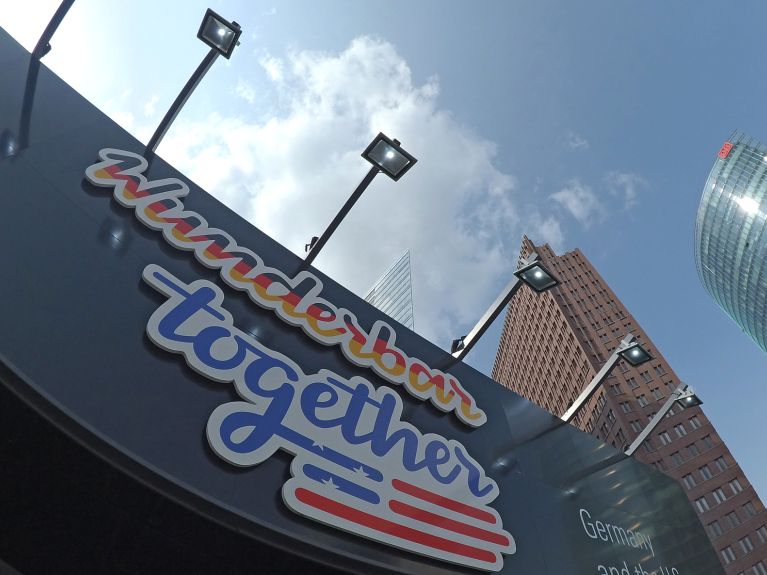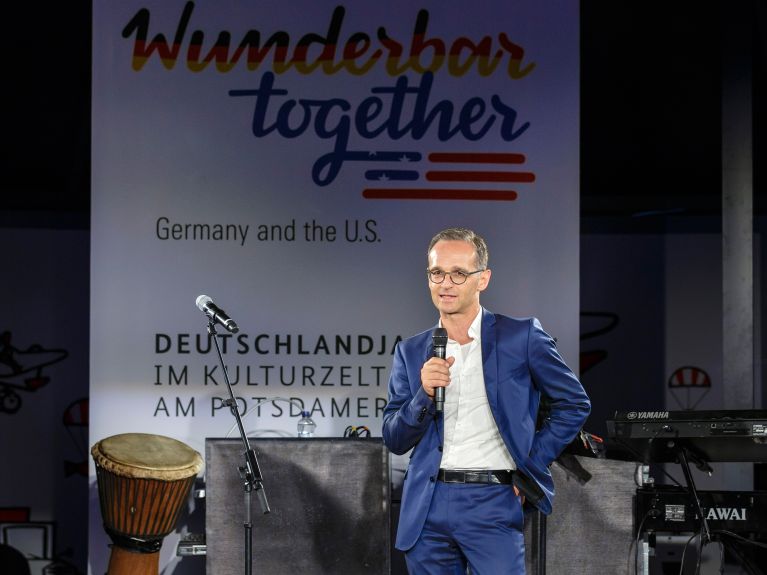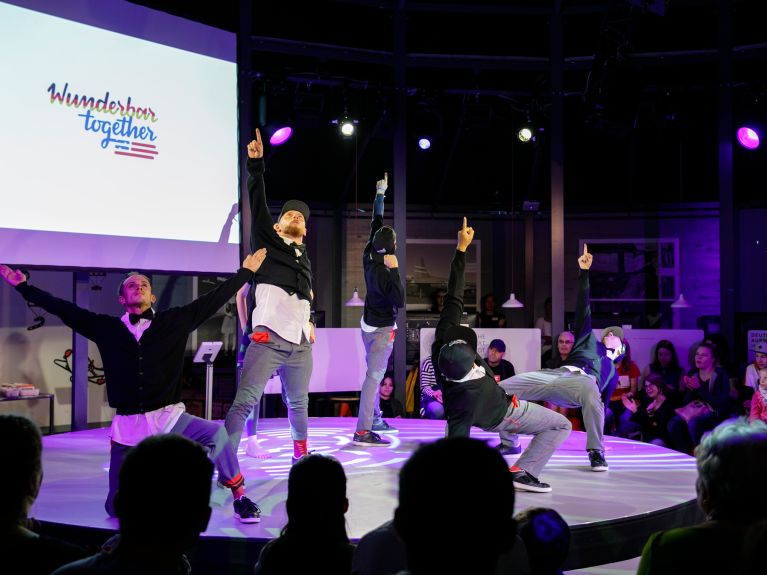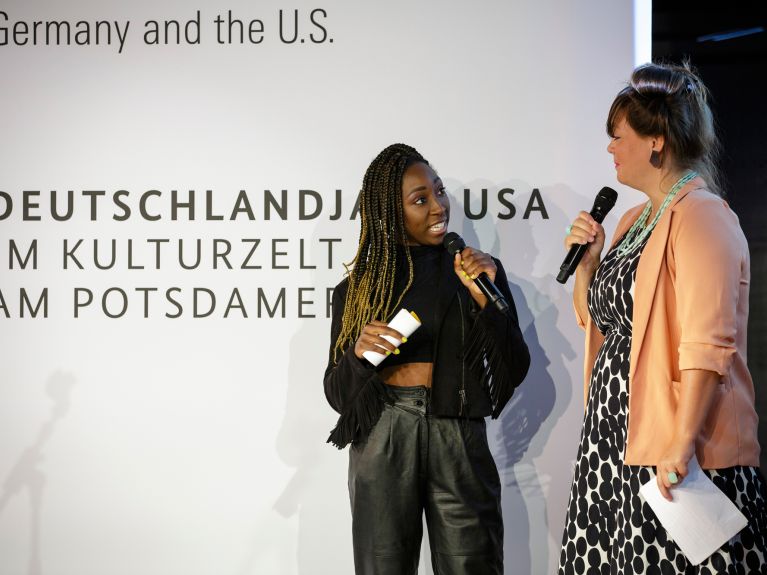„Together first“
October sees the launch of the Year of German-American Friendship. A first impression of the programme was presented in Berlin – with a “WanderbUS”, pop-up institutes and prominent guests.

A medium-sized tent, sturdy, but mobile. A colourful banner over the entrance, the outside otherwise resplendent in serious grey. Inside a small stage, discreet lighting, large historical black-&-white photographs on the walls. Anyone stepping inside notices that the focus here is on something very substantive, albeit in a pleasant and not overly stiff manner.
The location is the first strong statement on the programme for the Year of German-American Friendship with its motto of “Wunderbar together”: a culture tent, put up for two days, in the middle of Potsdamer Platz in Berlin. It served as the venue for a series of events that presented the concept for the ambitious project. The German Federal Foreign Office is hosting Tthe Year of German-American Friendship.together with the Goethe-Institut and BDI, the Federation of German Industries.
As current studies show, Germany is perceived favourably in the United States.
It is an interesting mixture of flexible, down-to-earth, and serious (and visitors can already sense this in the tent) – combined in concentrated form in the core message. One of the overriding goals of the Year of German-American Friendship is to forge links to people throughout the country, not just in the big cities but also in the heartland, the rural regions that go to make up the centre of the USA, says the German Ambassador in Washington, Emily Haber. And to that end it is important to be flexible, but also down-to-earth. “After all, the events are meant to be fun, too.”
German-American dialogue despite the tension
This by no means implies ignoring the current tension in transatlantic relations, such as the motto of the Year of German-American Friendship – “Wunderbar together” might suggest. However, differences at the political level have less of an impact on civil society than many might think, affirms Haber: “As current studies show, Germany continues to be perceived favourably in the United States, in fact to a growing extent – as an economic engine, a technology hub, and as a modern, tolerant, open-minded country.”
1,000 events in the USA
The idea is for the two civil societies to start talking, taking up the long-standing tradition of a common dialogue, precisely in view of current political tension. To this end, the Goethe-Institut, which is in charge of the programme planning, teamed up with 300 project partners to devise over 1,000 events. They include, for example, four pop-up institutes that the Goethe-Institut will open in vacant buildings and stores in the cities of Minneapolis, Houston, Kansas City and Seattle. “We want to improvise,” explains Christoph Mücher, who is coordinating the Year of German-American Friendship in the USA on behalf of the Goethe-Institut. “We’re fascinated by the question of what we can achieve in these cities with nothing other than an upbeat mindset, a little money, and a lot of enthusiasm.” To be as present in as many places as possible, a so-called “WanderbUS” will tour about 60 cities throughout the country and the Fulbright Commission’s “Meet-a-German” programme will take young German “ambassadors” to schools in all 50 states of the Union.
Click here to go to the website Wunderbar together
Science slams for business and science
Also on-board with projects is Berlin’s Haus der Kulturen der Welt, which is collaborating with the Max Planck Institute for the History of Science in Berlin to explore the history and significance of the Mississippi. The BDI, which is a partner supporting the Year of German-American Friendship, is contributing a pop-up tour called “Straight to Heart(land)”, in the course of which German companies will have an opportunity to present what they do. The venue will be the culture tent. “We would be delighted if formats such as science slams enable us to reach younger people, specifically in the key business cities between the two coasts,” comments Stefan Mair, a member of the BDI’s Executive Board. Plans envisage stops in Atlanta, St. Louis and Indianapolis, among other cities.
Becoming more independent does not mean turning your back on things. We still share many values.
Just how close the business links between the USA and Germany are and what this means for the future of transatlantic relations was something BDI President Dieter Kempf captured poignantly during a panel discussion “Germany and the USA – alienated friends?”: “The largest carmaker with the largest share of exports to the USA is BMW.” For three years now, the USA has been the single most important market for sales of German products, and for the USA Germany is the sixth largest export market. Calls for the greater economic independence of Germany and Europe from the USA are something Kempf finds right, but he insists that “becoming more independent does not mean turning your back on things. We simply still share a great many values.”
re:publica tours the USA with a digital roadshow
Just how much the two countries could benefit from each other on this basis is something that Melissa Eddy, Berlin correspondent of The New York Times, also notes. “Many Americans no longer find the German restraint they once smiled down on, for example as regards using new technologies, to be that off the mark,” she says. Journalist Markus Beckedahl, founder of the conference re:publica, agrees – the platform is taking part in the Year of German-American Friendship with a “digital roadshow” in Los Angeles, Austin, New York, Portland and Detroit: “Among members of the US public there is increasing respect for the German or indeed the European perspective on issues such as freedom of expression and data protection.”
“It is high time to re-evaluate our partnership – not in order to leave it behind us, but to preserve it,” suggests Federal Foreign Minister Heiko Maas. He twittered: “The motto ‘Wunderbar together’ is likewise the goal. You could also say: ‘together first’.”



